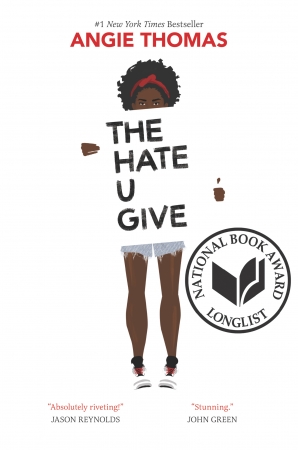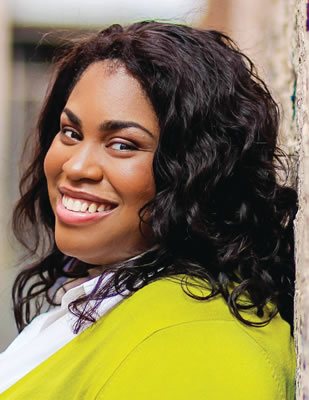Where Is Garden Heights Located
Angie Thomas, author of the bestselling debut YA novel The Hate U Give (Balzer + Bray), will be one of four keynote speakers at the American Booksellers Association's sixth ABC Children's Institute, to be held June 19–21 in New Orleans.
 Registration is open now for Children's Institute, which will also feature keynote speakers Chelsea Clinton, Temple Grandin, and Mallika Chopra; numerous educational sessions on a range of topics; and networking events, author receptions, and parties.
Registration is open now for Children's Institute, which will also feature keynote speakers Chelsea Clinton, Temple Grandin, and Mallika Chopra; numerous educational sessions on a range of topics; and networking events, author receptions, and parties.
The Hate U Give, which debuted in February 2017 at number one on the New York Times Young Adult Bestseller List, tells the story of a 16-year-old girl named Starr who sees her longtime friend Khalil gunned down by a police officer at a traffic stop. As Khalil's death becomes a national headline, Starr, as the sole witness, must decide whether to speak out about the truth of that night.
The Hate U Give was longlisted for the National Book Award, named a Printz Honor and a Coretta Scott King Honor book, and, most recently, was awarded the U.K.'s Waterstones Children's Book prize. Thomas, who grew up and still lives in Jackson, Mississippi, is a former teen rapper and holds a BFA in creative writing from Belhaven University.Bookselling This Week spoke with Thomas about her book and her upcoming appearance at Ci6. Thomas' next novel, On the Come Up, about a young female rapper named Bri living in Starr's community of Garden Heights, comes out next February from Balzer + Bray.
Bookselling This Week : How did you get the idea for your debut novel?

Angie Thomas (Photo credit: Anissa Hidouk)
Angie Thomas: I got the idea when I was in college. I was lot of like Starr: I attended a mostly white upper-class private Christian school here in Mississippi, but I lived in mostly a black poor neighborhood, and although it was 10 minutes from my school it was a whole different world. I thought I had to be two different people in these two different worlds, but my struggle to be two different people became harder after the shooting death of Oscar Grant in Oakland, California. His death and the fact that the cops were not charged led to a lot of unrest in Oakland and conversations in my school in Mississippi.
In my neighborhood we understood the anger and frustration in Oakland, but in my school, I had classmates who thought, "Well, maybe he deserved it. He was an ex-con, why are people so upset? He should have just done what they told him to do" — even though the video showed there was nothing that he did wrong. So my anger and my frustration led me to write this short story about a boy named Khalil, who was a lot like Oscar, and a girl named Starr, who was in those two different worlds, a lot like I was. That short story later became The Hate U Give. It took me a couple of years to decide to turn it into a novel, but that's really how it was born.
BTW : What will you be talking about when you appear in front of booksellers at Children's Institute?
AT: Well, I like to inspire people to find their voices and find their activism. So often, especially nowadays, a lot of us feel helpless; even in publishing we wonder, how can we do anything? Are we even making a difference? But the fact of the matter is we can make a difference. I often say, especially as a young adult author, the young people I write for now will be voting soon if they're not already voting; sometimes I think about it, too, that they'll be running this country before we know it. I'm often aware of the fact that a teenager who picks up my book today could be a politician with a Twitter account tomorrow.
I think it's important that we take that seriously, so I'm definitely going to be talking about that. I'll be talking about our role, no matter what that is, in publishing — how we can, in fact, change the world, and how we can affect the entire future through what we do, whether that is as a bookseller or an author. I'm really excited and I hope that I can get some people amped up and ready to do some work.
BTW : Do you have any ideas for what booksellers can do in their stores to work with authors to inspire activism?
AT: One of the key things for booksellers to do is to make more marginalized voices heard and make more of those narratives visible. We can't just have the same story over and over again. We often say in publishing that books are mirrors, windows, and sliding glass doors; we have to provide more of them because this is how kids understand what's happening to someone who maybe doesn't even look like them. We have to make kids more aware of what the world looks like. There are kids who are sheltered, who don't know or don't understand what black kids or what Latino kids are going through right now. We need to give them books so they can understand, so that they won't repeat our mistakes, and that takes booksellers getting behind books that cover a wide range of things.
BTW : Getting to know the character of Starr, her family, and her community is an antidote to the typical media narrative that discredits the victims of shootings by police. Do you think fiction can help authors create empathy through character development?
AT: Absolutely. I often say empathy is more powerful than sympathy, and I think books are one of the best tools for creating empathy. If you spend 300 or 400 pages with a character, I'd like to think that by the end you walk away with some empathy. For those hundreds of pages, you've put yourself in that character's shoes and you've had to see the world through their eyes. I hope that when you put it down you'll look at someone who is similar to that character and start to see the world through their eyes a little more as well. I definitely think books play a huge role in that.
BTW : The neighborhood that Starr lives in is called Garden Heights. Is that an actual place, or is it based on a real place?
AT: It's not an actual place, but bits and pieces are inspired by the neighborhood I grew up in and by different communities. I have family in Southern California and this is inspired by their neighborhoods in Englewood and Compton. There are definitely pieces in there of my neighborhood in Jackson. I also get to return to Garden Heights in my second book, On the Come Up, and explore it even more. But no, it's not a real place. I didn't want to name a city or a state for exactly that reason, because I wanted to show how this could unfortunately happen anywhere. I've had readers say, wow, this feels like my community, and that's exactly what I wanted to do.
I also chose the name Garden Heights because I wanted it to be a metaphor for this garden where you have what Tupac would refer to as "roses in concrete," which is based on a poem he wrote as a teenager. For me, Starr is a rose in the concrete known as Garden Heights.
BTW : Your book was acquired by Balzer + Bray/HarperCollins in a 13-house auction and was a sensation when it came out. The movie version starring Hunger Games actress Amandla Stenberg just wrapped. What would you say has been your coolest experience since then?
AT: I got to meet President Obama, which was amazing, I've had the chance to travel the world, but for me the best part by far is when I have young black girls come up to me and say, "Thank you for this book because it's the first time I've seen myself in a book." Or when black teenagers come up to me and say, "This is the first book that I've read from beginning to end." These are the kids who are often written off and called reluctant readers, and for the longest time publishing didn't give them books that they could see themselves in because they made the assumption that they wouldn't read. To know that I've shown them themselves enough that they're like, yo, I like reading — that's amazing to me.
BTW: What has been the role of indie bookstores and indie booksellers in your life and as a writer?
AT: First of all, I feel like I owe booksellers my firstborn because it really has been the efforts of booksellers that have made this book go as far as it has. I'm extremely grateful for that. I also remember being a kid and going into a bookstore and not being able to afford a book, but I would look on the books on the shelves, and I remember a bookseller telling me, if you want to just sit there and read the books I won't have an issue with it. As a kid who was poor, that was amazing. It's the small things like that that booksellers do that make a huge difference. Now as an author, I see a whole different side of it, just how hard they champion books. If it were not for them, many of us authors would not have careers.
Where Is Garden Heights Located
Source: https://www.bookweb.org/news/hate-u-give-author-angie-thomas-speak-childrens-institute-103725
Posted by: falconefifue1964.blogspot.com

0 Response to "Where Is Garden Heights Located"
Post a Comment